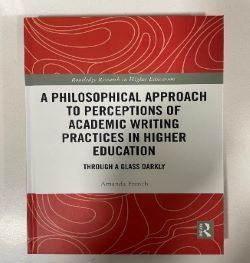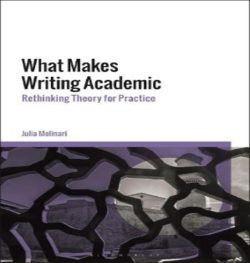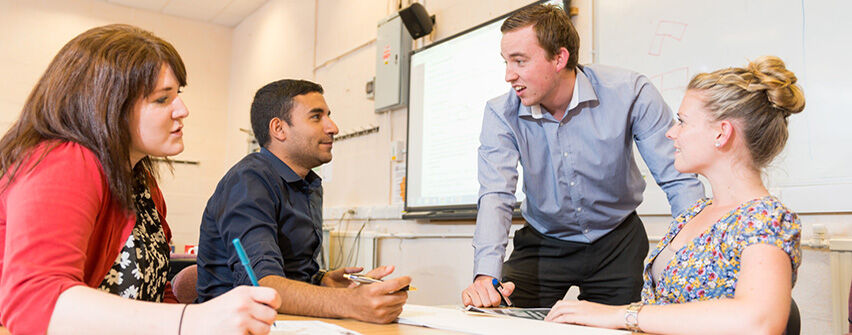
Blog

At the heart of this conversation lies the premise that certain exclusionary and regressive conceptualisations of anglophone academic writing are inherent to ‘the business’ of contemporary higher education’s teaching, learning and knowledge exchange. Why, ask the authors, do equally established and alternative writing imaginaries rarely take root? Why are academic writing’s ‘common-sense’ attributes of putative clarity, linearity, objectivity so ubiquitous and so rarely critiqued, when in fact they exert a powerful and often pernicious influence over teachers, students and researchers? Our conversation seeks to deconstruct and challenge what academic writing is, what it does and for whom in order to provoke and propose more equitable, sustainable and innovative forms of academic writing.
and Dr Julia Molinari - Lecturer in Professional Academic Communication in English (Open University)
Each of our books poses a central, related question: ‘what is academic writing?’ (Mandy) and ‘what makes writing academic?’, (Julia), and perhaps therein lies an opening for us to explore: what is the difference between our starting questions and where do the answers lead?

Both our theses and the resulting monographs shared a desire to practise what we preach by expanding and exploring the limits of doctoral and professional academic writing. We did this partly through the form and style of our texts but also through their contents and arguments. Although neither of us knew about the research of the other, the synergies we have since discovered have been striking and echo several of bell hook’s calls: we both seek to ‘radicalise classroom spaces’ and bring ‘pleasure’ to them by re-thinking how else academic writing practices, processes and texts could be. We also see academic writing as a practice that can both hinder and advance social justice. We will be discussing all of this and giving examples of how and why we have troubled academic writing in this way at different points throughout our books.
Our shared starting point and concern for how academic writing is conceptualised similarly extends to somehow ‘setting the record straight’ when it comes to imaginaries about ‘what academic writing is’ and ‘what makes it academic’. Our views of academic writing may be unsettling for some, but refreshing and hopeful for others. Some may see them as being in opposition to what is currently perceived to be the norm but equally, our views might afford understandings of why the norm is fundamentally flawed: it is this methodological troubling that we would like to explore and discuss with other delegates.

Although we clearly share similar sensitivities and frustrations about restricted, deficit, exclusionary and reductionist views of academic writing in higher education, we have chosen different theoretical frameworks to answer our respective research questions: Julia sought her answers through her readings on critical realist philosophy because of its emphasis on the complex, relational stratified ontologies of open systems that account for how novel social practices (which include academic writing) can emerge. Critical Realism allowed Julia to highlight how agency, especially collective agencies, can lead to social transformation. Amanda, on the other hand, mobilised post- quantitative research to explore the ineffable nature of academic writing which persists despite the very utilitarian way it is commonly taught and assessed in HE.
How our methodological approaches differ and how they can be brought into conversation with each other also has the potential for a fertile and lively debate!
Just working through these different approaches and the rationales for why each researcher mobilised them is in itself generative for any methodological discussion on academic writing in the academy because each approach affords a focus on the ineffable, contested and emergent nature of academic writing practices. This, in turn, allows both researchers to highlight the need for diverse writing pedagogies to emerge, including multimodal and multilingual approaches to texts. For example, where Mandy talks of educating teachers about the complexities and histories of ‘ecologies of literacies’, Julia proposes ‘scholarship and pedagogy as a lever of change’: both suggest that university lecturers, supervisors and academic writing tutors need support if they are going to be the ‘levers of change’ that can foster the progressive, pluralised and democratised writing spaces that we are advocating. It seems to us that it is only through knowledge, collective action and a fertile sociological imagination (Mills) that we develop the confidence to show that things can always be other than they are. As bell hooks wrote:
"Educating is a vocation rooted in hopefulness. As teachers we believe that learning is possible, that nothing can keep an open mind from seeking after knowledge and finding a way to know."
In this spirit of hopefulness and finding a way to know, we seek to not only revolutionise academic writing in higher education but also dismantle the structures that prevent it from changing. How we do this, who does it, what new or existing structures might replace the once we critique and what diverse textual ecologies might emerge from such a ‘revolutionary deconstruction’ are just some of the puzzles we’d like to have a go at piecing together.
Ultimately, we have found ourselves occupying shared research ground and values when it comes to troubling academic writing in the academy, even though we have approached this interest in different ways. Crucially, however, our research speaks beyond its explicit concern with writing and extends to the deeper ethical, ideological, ontological and epistemological foundations upon which anglophone academic writing practices are founded: issues of power, justice, transformation, colonialism, neoliberalism, knowledge, identity, geography, abilities and capabilities, inclusions and exclusions are at stake in any critique of how academic writing is understood, taught and learnt. These are political concerns. They matter because they both determine and transcend any conceptualisation of and practices around academic writing in higher education.
With this and more in mind, we look forward to a discussion that is about much more than academic writing!
